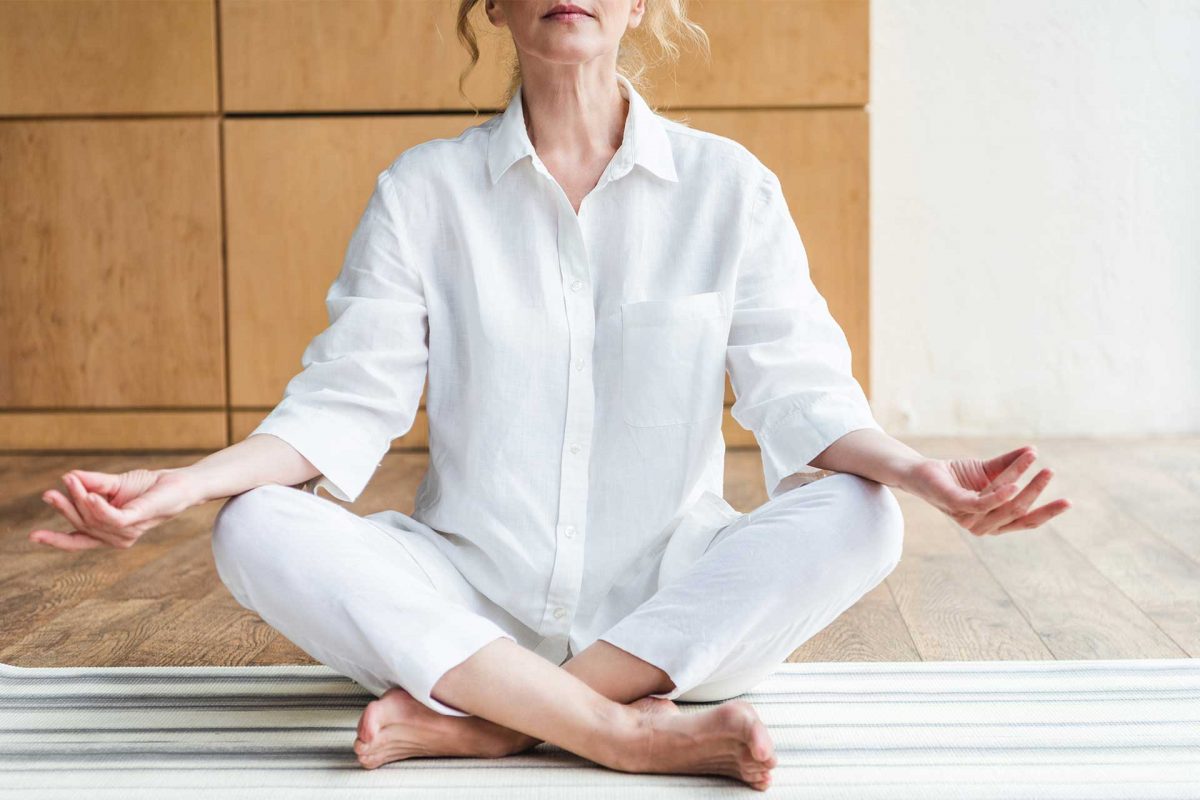Mindfulness has been a buzzword in the wellbeing industry for the last few years. You may have heard it mentioned at your Pilates or yoga class, perhaps at work, or even at your local coffee shop! It’s taken the world by storm in the form of colouring books, mobile apps, and in-person classes, as people look for ways to bring peace and calm into their lives. But what exactly is mindfulness?
Define: Mindfulness
Simply defined, mindfulness is the ability to be fully present and engaged in the moment. Our minds are usually constantly buzzing with worries over the past and future, and we struggle to focus on what is happening right in front of us – especially with the fast pace of modern life.
Mindfulness is a skill which you need to build and train, in order to teach the mind to be present. This is achieved through mindfulness meditation practice, which allows your mind to familiarise itself with the here and now for a short period.
To be in a state of mindfulness, however, should not be thought of as temporary – only happening when you are meditating. Meditation is the training ground for your mind, to allow you to develop full engagement with the present in your daily life.

The Benefits of Mindfulness
But why do I want to practice mindfulness, I hear you ask?
Whilst practices such as mindfulness and meditation may have previously been firmly in the realm of alternative medicine, they have definitely come into the mainstream over the last decade or so. Countless studies have been conducted by psychologists and academics – asking questions such as “What does it mean to be happy?” and “How can you best reduce stress in your daily life?” These studies have found that taking time to practice mindfulness and to meditate has a massive effect on your mental and physical wellbeing.
Mindfulness for Stress and Anxiety
Worrying is, unfortunately, a natural part of life – especially in times of change and uncertainty. For some people, however, this worry can turn from a ‘every now and again’ thing to overthinking which induces overwhelming stress and anxiety.
Stress is a physical, mental, or emotional response to external or internal factors which initiates the ‘fight or flight’ response. This triggers bodily responses such as an accelerated heart rate, an inhibited digestive system, and a release of adrenaline.
Anxiety is a state of emotional toil, closely linked to stress and fear, which is usually an unfocused overreaction to a situation perceived to be threatening. It induces muscular tension, fatigue, restlessness and problems in concentration.
It’s clear that the effects of stress and anxiety are overwhelmingly negative for both your mental and physical wellbeing.
By practicing mindfulness, you can retrain your brain to focus on the present moment, which stops you from becoming overly reactive or overwhelmed by worries and negative thoughts. It instead helps you to accept and examine these thoughts, rather than avoiding or reacting to them instinctively. Mindfulness builds a stronger and more positive coping mechanism, where you can observe every thought as it passes through your mind.
Stress and anxiety narrow your vision, forcing you to only focus on the situation that’s worrying you. Professor Mark Williams, of the Oxford Mindfulness Centre, states that mindfulness “lets us stand back from our thoughts and start to see patterns. Gradually, we can train ourselves to notice when our thoughts are taking over and realise that thoughts are simply ‘mental events’ that do not have to control us.”
By setting aside time to breathe and be mindful, you will naturally see the bigger picture and be able to resolve the situation with higher emotional intelligence and better decision-making.

Mindfulness for Health
Scientists have found that mindfulness is an important contributor to your general health. It has been proven that to help lower blood pressure, reduce chronic pain, and even alleviate gastrointestinal difficulties. Mindfulness has also been shown to enhance your body’s ability to cope with illness. How does it do all of this though?
By bringing your mind into the present, rather than chasing thoughts about past and future worries, you are naturally reducing your stress levels. Knowing the ways which stress affects your body, as we outlined above, it’s clear that this will have positive effects on your body and general health.
Mindfulness is also linked to lower rates of smoking, and higher rates of physical activity, meaning that practicing mindfulness promotes healthy habits.
Mindfulness for Sleep
Sleep is an essential time for our bodies and minds to reset and refresh each day, but did you know that almost half of us are sleep-deprived? Most people report having difficulty falling asleep or staying asleep.
One of the main contributing factors to sleepless nights is stress – it really is incredibly bad for you! Lying awake, ruminating on real and imagined problems, and tossing and turning as you become increasingly frustrated with still being awake; does this sound familiar? If it does, you’ll be amazed by how practicing mindfulness can lead to a better quality of sleep.
Whilst your mind may be distracted during the day, once your head hits the pillow and the lights turn off, negative thoughts become louder and harder to ignore. As you’ve learned, mindfulness reduces stress and quiets your mind, which is absolutely essential to a good night’s sleep. So if you’re looking to become more rested and energised, mindfulness is a good solution for you!

How to Practice Mindfulness
Mindfulness is not something which just happens. It’s important to take the time to train your mind to focus on the present moment. When you first begin your mindfulness practice, don’t be discouraged by how busy your mind is. Remember, quieting your mind is a skill you need to build. The more you practice, the more naturally it will come.
There are a number of ways you can practice mindfulness, so make sure to check out our online Mindfulness classes with Ros Hoyes to learn how best to incorporate mindfulness into your life.
Our Top 5 Mindfulness Techniques
- Body Scan: This technique will boost the connection between your body and mind. Slowly focus on each part of your body, from head to toe, and bring awareness to any sensations, or discomfort, which exists.
- Breathe – Breathing is the easiest and most common way to meditate. You anchor your mind by drawing all of your attention to your breath, and whenever you get distracted you simply return to your breath. It’s so simple it can be done anywhere, anytime!
- Set your intention – aligning your conscious mind with your motivation for the day will allow you to strengthen your emotional intelligence and make more rational decisions. Throughout the day, make sure to re-centre yourself to meet your intention.
- Let your mind rest – rather than choosing something to focus on, you can encourage mindfulness by simply letting your mind rest. Let any and all thoughts enter your mind, observe them, and let them pass. This will train your mind to not react or distract from negative thoughts and, instead, to simply accept them.
- Reconnect with nature – as the saying goes, it’s important to take some time to stop and smell the roses! Disconnect from technology and the busy pace of modern life, and reconnect with nature instead. Go for a walk and observe everything – from what you see to how the weather feels or even what you can hear!

Mindfulness Will Change Your Life…
So what are you waiting for! Start practicing mindfulness today and you’ll be amazed by the positive changes you see in your life. It’s so easy to improve your life by simply taking 20 minutes a day to practice mindfulness. Your health and wellbeing are absolutely integral to your overall happiness, so it’s important to take the time out to take care of yourself.









Can you let me know where I can find the prices please
You can get in touch with us to find out more information on prices by emailing info@flavoursholidays.com or give us a call on 0131 343 2500
i could be interested in this